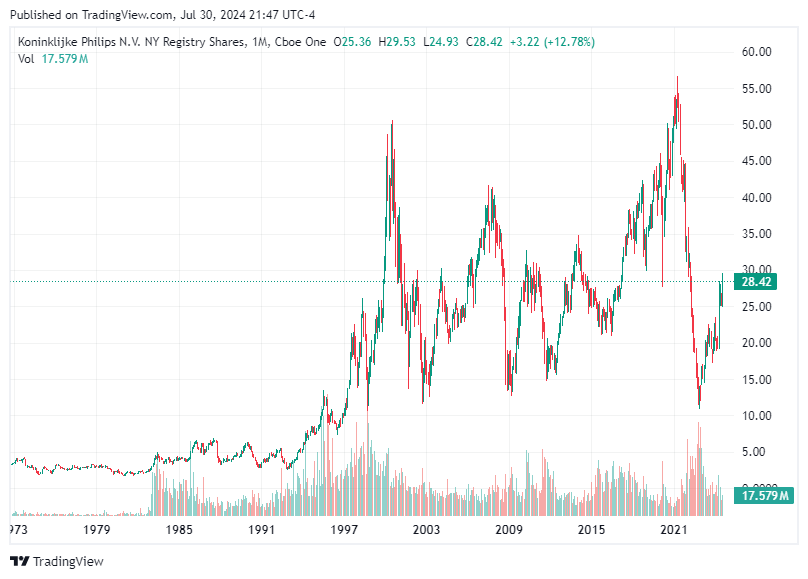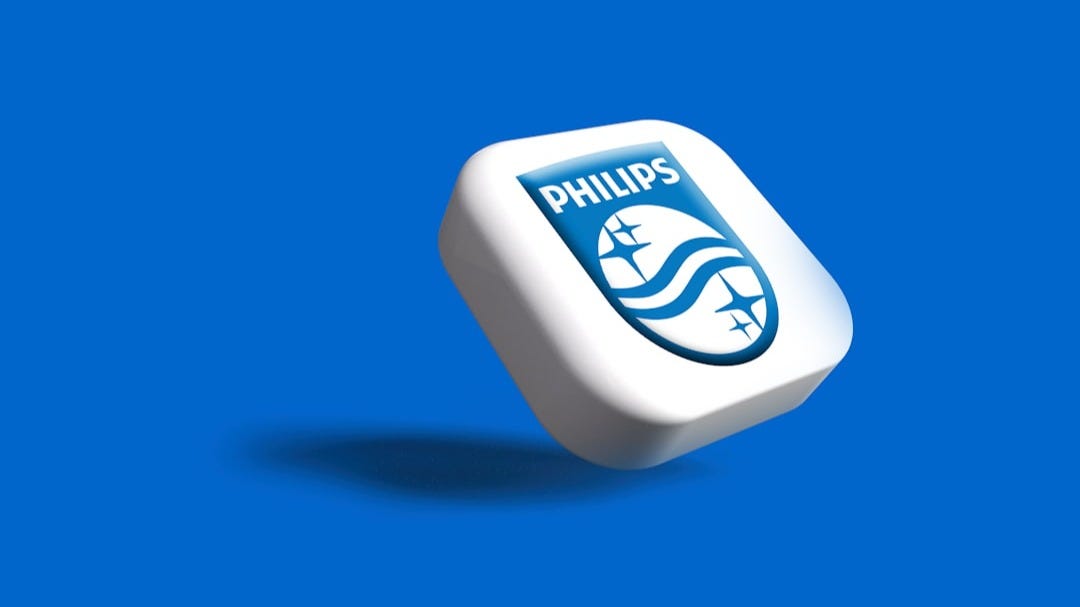Health Technology Company Beats Earnings Forecasts
Philips Earnings Beat Forecasts as Orders Recover.

Disclaimer: This article is for informational purposes only. It is based on recent financial data and market analysis of Koninklijke Philips N.V. (Philips). The information provided does not constitute financial advice or an endorsement of any investment strategy. Readers should conduct their own research or consult with a professional advisor before making any investment decisions.
Real-time information is available daily at https://stockregion.net
Koninklijke Philips N.V., commonly known as Philips, has recently reported its earnings for the second quarter of 2024. The earnings surpassed forecasts, helped by insurance payments related to its sleep apnea devices. Philips experienced a rebound in order intake, marking the first positive order growth in two years. This positive performance boosted early trading shares.
Financial Performance
For the second quarter of 2024, Philips reported earnings of €0.48 per share. This is a substantial improvement from the same quarter last year when the company earned €0.07 per share. This notable increase points to a stronger financial position and improved operational efficiency. Despite a slight decline in overall sales, Philips’ comparable sales—which include adjustments for consolidation charges and currency effects—rose by 1.5% year-over-year. The sales for Q2 2024 stood at €4.46 billion, reflecting a 0.2% decrease from the previous year. However, this marginal dip was offset by growth across various segments:
Diagnosis & Treatment: This segment saw mid-single-digit growth.
Connected Care: Recorded low-single-digit growth.
Personal Health: Also showed low-single-digit growth.
One of the key highlights of the report was the 9% year-over-year increase in comparable order intake, driven primarily by strong demand in China. This marks a turnaround for Philips, which had seen negative order trends over the past two years. Sales in growth geographies saw a 3% improvement on a comparable basis, while mature geographies recorded a 1% year-over-year increase on the same metric.
Segmental Performance
In the Diagnosis & Treatment segment, revenues rose by 2.8% year-over-year to €2.17 billion. Comparable sales increased by 4.2%, fueled by double-digit growth in Precision Diagnosis and Image-Guided Therapy. These areas are crucial for advanced medical diagnostics and treatment, highlighting Philips' innovation and leadership in the healthcare sector. The Connected Care segment experienced a 0.4% year-over-year increase in revenues, totaling €1.33 billion. Comparable sales grew by 2%, driven by robust performance in Enterprise Informatics. This segment’s growth reflects the increasing importance of connected healthcare solutions, particularly in light of ongoing digital transformation in the healthcare industry.
Revenues in the Personal Health segment fell slightly by 0.2% year-over-year to €834 million. However, comparable sales rose by 2.2%, primarily due to strength in growth geographies. This segment focuses on consumer health products, including personal care and home health items, and is vital for Philips’ diversified portfolio.
Other segment sales amounted to €121 million, representing a 36.6% decrease year-over-year. This category includes various smaller business units and non-core activities, illustrating Philips’ strategic focus on its primary segments.
Operating Details
Philips’ gross margin expanded by 70 basis points (bps) year-over-year, reaching 44.6% for the reported quarter. This improvement can be attributed to better cost management and operational efficiencies.
General and administrative expenses remained stable at 3.5% of sales compared to the previous year. Selling expenses increased by 40 bps to 25.3%, while research and development (R&D) expenses decreased by 100 bps to 9.5%. The reduction in R&D spending may indicate a shift towards more efficient project management and prioritization of high-impact initiatives. Philips reported restructuring, acquisition-related, and other items amounting to a net gain of €381 million, compared to a loss of €161 million in the same period last year. The company’s productivity programs, including operating model productivity, procurement savings, and other initiatives, delivered total savings of €195 million. This demonstrates Philips’ ongoing efforts to streamline operations and enhance profitability.
Adjusted EBITA, Philips’ preferred measure of operational performance, increased by 9.3% year-over-year to €495 million. The EBITA margin expanded by 100 bps to 11.1%. Here’s a closer look at segment-specific margins:
Diagnosis & Treatment: The adjusted EBITA margin expanded by 160 bps to 12.2%, driven by improved sales, pricing, and productivity measures.
Connected Care: The segment’s adjusted EBITA margin increased by 130 bps to 8.8%.
Personal Health: This segment saw the most significant improvement, with the adjusted EBITA margin expanding by 350 bps to 16.9%.
Balance Sheet and Cash Flow
As of June 30, 2024, Philips had cash and cash equivalents totaling €1.8 billion, up from €1.4 billion at the end of the first quarter. Meanwhile, total debt increased to €8.265 billion from €7.737 billion. The rise in debt could be part of the company’s strategy to finance growth initiatives or manage working capital needs. Philips reported an operating cash inflow of €89 million, down from €135 million in the year-ago quarter. Free cash flow saw an outflow of €64 million, compared to a modest inflow of €5 million last year. This decline in free cash flow may warrant closer scrutiny, as it could impact Philips' ability to invest in future growth opportunities or reduce debt.
Philips has provided guidance for the full year, expecting comparable sales growth of 3-5%. This optimistic outlook suggests confidence in continued recovery and expansion across its core segments. The company’s focus on innovation, operational efficiency, and strategic market presence will be crucial in achieving these targets.
Philips’ second-quarter 2024 earnings report highlights a turnaround in financial performance, driven by insurance payments related to sleep apnea devices and a resurgence in order intake. The company’s diverse portfolio, coupled with strong geographic performance and effective cost management, positions it well for sustained growth. However, the decline in free cash flow and increased debt levels are areas that investors may want to monitor closely.
Disclaimer: The information provided in this article is based on Philips' financial reports and market analysis. It does not constitute financial advice or an endorsement of any investment strategy. Readers are encouraged to conduct their own research or seek professional advice before making any investment decisions.
Real-time information is available daily at https://stockregion.net


